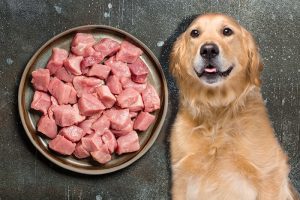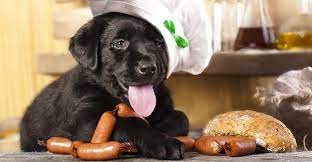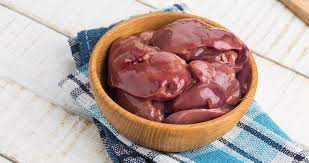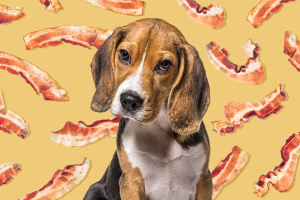
Avoid eating raw pork because it can contain the Aujeszky virus, which can make dogs develop the lethal neurological condition pseudo-rabies. Furthermore, other bacteria, such as trichinae or salmonella, may be present in raw pork.
Pork must be roasted to at least 55°C for at least 30 minutes before feeding it to dogs or cats, never raw. The cause of this is a virus that causes the ailment known as Aujezsky’s sickness.
This viral illness, which also affects other animals like pigs, can be passed on to dogs and cats through contact. This illness is usually deadly and has no known cure.
Humans are not at risk from the infection. It is imperative to avoid offering pork while feeding dogs raw food—and cats, by the way.
The same goes for feeding our pets natural tableside pig products, such as raw ham. Can a dog eat pork?

Pork-flavored dog food
A food containing pork or wild boar meat can provide a good food option, especially for animals with intolerances, as pork is an uncommon protein source in dog and cat food. By the way, dogs frequently take pork extremely well, and it has less fat than is typically believed. The flesh of wild boars, in particular, has a strong scent and is prized by humans.
Are dogs able to eat roast pork?
A saucepan rather than a frying pan is preferable when cooking for your dog.
Unfortunately, “hazardous pork” cannot be made into a pet-safe supper with just a fast sear.
Do dogs develop allergies to pork?
Like any other protein, pork can trigger allergies. But this occurs more frequently with beef or chicken.
Your dog won’t have an allergy to pork if he has never had it.
Aujesky-free pork is a fantastic option for an elimination diet if your dog has food allergies and has never eaten pork.
Can dogs munch on bones from pigs?
Feeding pork bones is not something we advise.
It is not advisable to feed raw pig bones since the Aujeszky virus can only be eradicated by high heat.
Cooked bones shouldn’t be given to dogs since they become brittle from heating and shatter more easily.
Are pork ears permissible for dogs to eat?
Since they are significantly fatter and more flavorful than rabbit, calf, or cow ears, dried pig ears are even more popular with most dogs.
You can periodically feed your dog dried pig ears as a chew that has not been treated.

When giving your dog pork, remember this:
Pork is not risk-free to feed to dogs because pigs may carry Aujeszky’s disease. Unfortunately, dogs will always die from this illness.
Before sale, commercially produced pork-based dog food is tested for the virus.
As a result, food sold in the pet food industry is regarded as secure and devoid of Aujeszky’s disease.
Can dogs taste pork and baked beans?
Can a dog eat pork and beans? The classic summer BBQ fare includes hotdogs, hamburgers, corn on the cob, and excellent baked beans that are sweet and sour.
The majority of people adore these foods since they are delicious and comfortable. It can be tempting to sneak some tasty snacks to all dogs attending a family gathering in the summer.
When there is a party, it is usually pleasant to give your dog or other people’s dogs some of your favourite foods.
All dogs should avoid eating baked beans because they are loaded with sugar and frequently contain poisonous and unhealthful substances like loads of onions and garlic.
Sharing a piece of a basic burger with a furry buddy is acceptable, but avoid giving them baked beans.
Dogs and pork belly
Yes, dogs may consume pork in small amounts, but when making a meaty treat for your pet, it’s better to keep things straightforward, just like any other form of meat. Give your canine partner a plain and uncomplicated piece as a treat, saving your seasonings for the family feast.
Additionally, consuming hog fat that has not been fully cooked might result in pancreatitis and trichinosis. Veterinarians advise against giving cooked or uncooked animal fats to your dog.

Can dogs consume pork chops?
Keep an eye out for symptoms of GI distress, such as vomiting, diarrhoea, or loss of appetite, depending on the size of the pork chop consumed. A trip to your veterinarian is advised if the bone is a sizable chunk that may present an obstruction risk if ingested.
Is pork fat safe for dogs?
Dogs have trouble digesting a particular type of lipid abundant in pork, which can cause indigestion and pancreatic inflammation.
Occasionally, giving your dog a bite of fatty bacon will only make him happier. (And when we say one mouthful, we mean it. (Salt and fat are abundant in bacon.) On the other hand, avoid feeding your dog pork fat. Your dog will benefit from eating various nutritious, healthy fats, such as fish oil, coconut oil, and olive oil.
Can dogs eat pork livers?
The answer is yes; liver makes a delectable meaty treat that can help your dog get more protein and vitamins in his diet. Most dogs enjoy the flavour of liver, whether cut up and baked as a homemade treat or added to dog food.
Pork liver is substantially lower in nutrients and contains less fat and cholesterol than chicken liver. Pork liver is safe for your dog to eat, but due to the risk of trichinosis, it is advisable that portions be kept modest and that the liver is always boiled before serving.

Can dogs consume pork skins?
Dogs, either raw or cooked, cannot consume pork skins. The high-fat content of cooked pig skins can cause health issues for your dog.
Because raw pork meat may contain germs or parasites like Trichinella spiralis larvae, which can cause a parasitic ailment called trichinosis, the raw pork rinds used to produce handmade pork cracklings are dangerous. Instead of feeding their dogs raw pork, dog owners should choose safe, canine-friendly diets.
Can dogs eat pork meat?
Due to the parasite trichinella spiralis larvae, which can result in the parasitic sickness known as trichinosis, eating raw or undercooked pork is unsafe for both people and dogs. When a dog consumes the muscles of an animal with the trichinella parasite, it may contract the infection, which is spread by swine flesh.
When your dog chews on pork bones, whether raw or cooked, they are likely to splinter and break. Small portions of the pig bone may be attempted to be swallowed by your dog, which could result in choking, intestinal obstructions, or damage to the oesophagus or intestines. These situations are all quite risky.
Pork rinds and dogs
Pork rinds are inedible to dogs. Although it may seem alluring to give your dog a treat of homemade crispy pork rinds, please do not do so because they are poisonous and do not add any nutritional value to your pet’s diet.
Pork rinds are low in carbohydrates, but because they are high in fat and salt, they are not part of a healthy dog diet. Don’t give a bag of pork rinds to your pet. Pork rinds are dangerous due to their presence of:
1. A lot of fat: Pork rinds are quite high in fat. It may be difficult for your dog’s digestive tract to process this fatty food.
2. A lot of salt: Your dog may experience major health issues due to the high salt content in pork rinds, including high blood pressure or salt poisoning, which can cause symptoms including vomiting, trembling, and excessive thirst or urine.
3. Toxic additives: Flavored pork rinds could contain unhealthy ingredients for your pet. Never give your pet spicy or cinnamon-sugar pork rinds. Adding preservatives and substances like garlic or onion can cause stomach aches. At the same time, cinnamon-sugar variants’ high sugar content can cause several health conditions. In particular, if your dog has a sensitive stomach, avoid giving them any spicy meals.
4. Unhealthy oils: Boil the pig rinds, then deep fry them at high temperatures to make cooked pork rinds. All fried meals can upset the stomach, induce weight gain, obesity, and even life-threatening conditions like pancreatitis. Fried pork rinds are particularly oily.

Before sharing with your dog
Consult your veterinarian before adding any human foods to your dog’s diet to ensure it’s safe because some human foods might make dogs respond poorly.
What else?
Fortunately, dogs may consume tiny amounts of olive oil without any problems. It might even be advantageous for them. Olive oil helps promote healthy skin and helps your dog’s coat shine when consumed regularly.

Leave a Reply